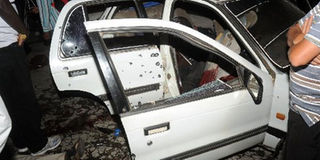Government can do more to fight crime

A vehicle sprayed with bullets on July 13, 2013. Seven gangsters were shot dead on Sunday night in a botched kidnapping attempt at Moi Flats, less than one kilometre from the Nakuru Central police station. PHOTO | FILE | SULEIMAN MBATIAH
What you need to know:
- If by analysing crime data we realise that most bank robberies occur on the first Friday of the month, then we can move our resources around to ensure that on those days, we have our guns ready to counter.
- In a re-engineered process, the police are only involved in stopping the driver; hence less police resources are involved to achieve the same or even better results.
- Crime, like everything else that stinks, leaves a trail. It is the responsibility of the police to retrace steps, identify the cause and figure out the connection.
Organised crime threatens our security, the prosperity of our business community and the freedom of Kenyan citizens.
There have been numerous actions and suggestions made by the government and the police to curb rising insecurity, but a national dialogue on crime is long overdue.
I would like to play my part in that dialogue by adding a few practical approaches that can be used by the government and the police to secure our country for us and for our children.
USE DATA
Crime is not random. Criminals spend time to plan their activities.
If the police took time to analyse crime data, a pattern will emerge that will help them stop crime.
If by analysing crime data we realise that most bank robberies occur on the first Friday of the month, then we can move our resources around to ensure that on those days, we have our guns ready to counter.
Data analysis does not have to be complicated and expensive. Start with measures of central tendency; you will be surprised by the type of information points that emerge.
New ways of reporting crime and gathering data must be encouraged. Use of call centres in addition to police stations to report crime, for example, will ensure better data sources.
USE SCARCE RESOURCES EFFECTIVELY
Police have to re-assess their processes and re-engineer them to make better use of scarce resources.
The police should emulate private-sector best practices. Take, for example, the current fight against drunken driving. When the police stop drunken drivers, they arrest them and release their cars.
Police resources have to be spent guarding the drunkards, transporting them to jail, booking them in and out of jail, taking them to court, and processing their release.
What if the police re-engineered the process to confiscate the car and release the driver? The car would be towed by a third-party breakdown service and stored at the cost of the driver.
If controls are built around the process to ensure that the car is only released to the now-sober driver once he or she pays the court fines, the driver is highly motivated to sober up and reclaim their car.
In the re-engineered process, the police are only involved in stopping the driver; hence fewer police resources are involved to achieve the same or even better results.
Re-engineering is advisable for all police processes.
FOLLOW THE TRAIL
Crime, like everything else that stinks, leaves a trail. It is the responsibility of the police to retrace steps, identify the cause and figure out the connection.
There is a link between rent laws in Nairobi and cholera deaths in Moyale.
A landlord in Nairobi rents out his premises to someone who prints fake qualification certificates, which are bought by John Doe, who travels to Moyale and lands a job as a health officer.
John Doe does not know anything about public health and is therefore not able to contain a cholera outbreak in Moyale. This leads to many deaths.
This is a simple example, but there are many instances where crime can be prevented by focusing on eliminating the causation factors.
DELEGATE RESPONSIBILITIES
The police should use private-public partnerships to delegate some of their responsibilities.
For example, although it is the responsibility of the police to investigate crime, their efforts would be boosted if they had a partnership with every landlord to among other things:
a) keep a record of their tenants, including copies of their IDs,
b) verify tenants’ employment or income sources,
c) regularly inspect their premises during a tenant’s stay. If, for example, criminals expected a premise inspection, they will be discouraged from carrying out their activities in those premises.
This is important especially where the police deal with causation activities.
What if a private-public partnership required all businesses in the city to provide lighting and CCTV cameras for their premises and the street in front of their premises?
In conclusion, there is so much more that can be done in the fight against crime.
The writer is a financial forensics and internal controls consultant. He is also a PhD student in public administration at the University of Texas-Arlington.




